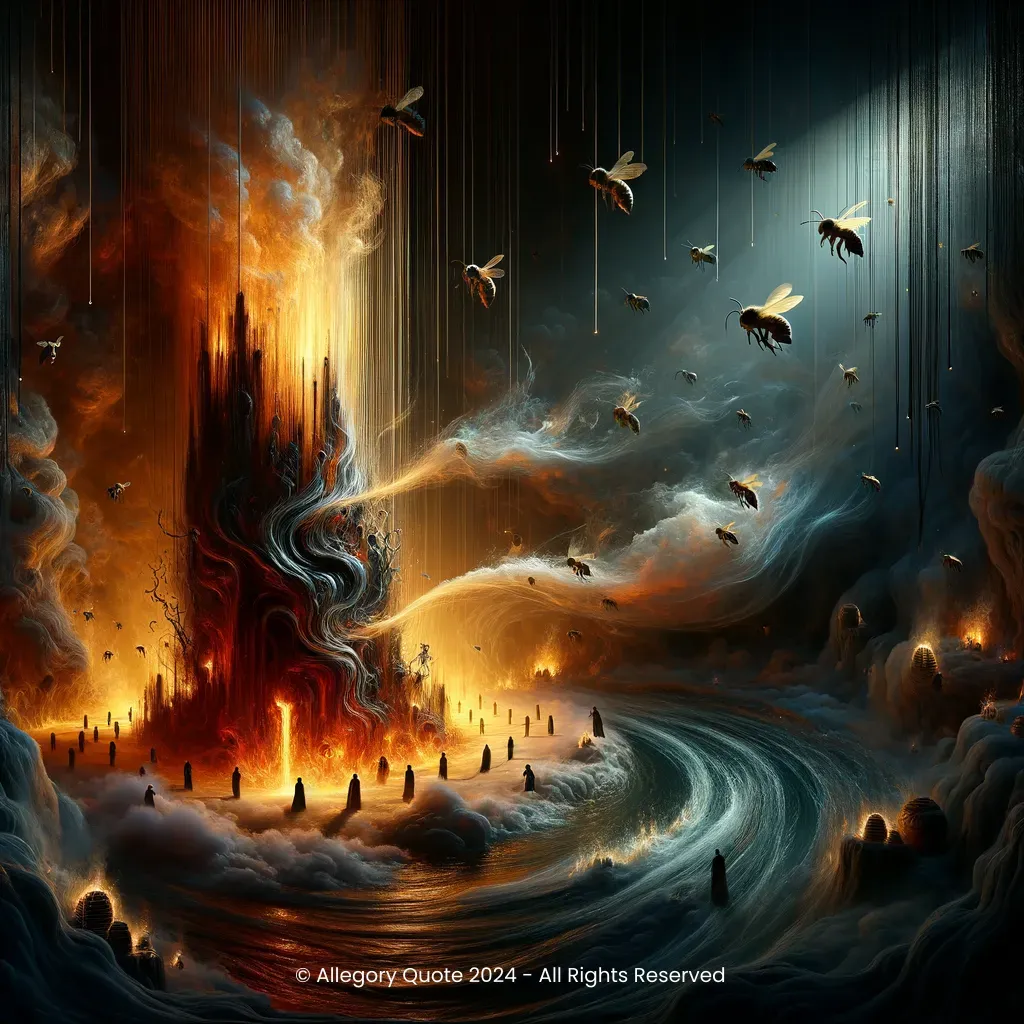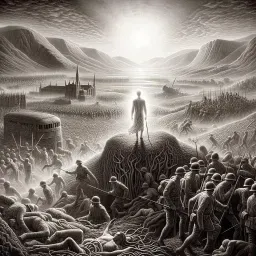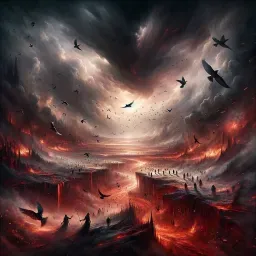”He had already reached the place where the roar
of water falling into the next circle could be heard,
similar to the buzzing of beehives“

- Meaning
- The meaning of this sentence depicts a moment when Dante and Virgil, in their journey through Hell, reach a point where the noise of falling water creates a deep and continuous sound, similar to the buzzing of beehives. This comparison helps convey the intensity of the noise and the dark and unsettling atmosphere of the place.
- Allegory
- In the allegorical image, the falling water symbolizes the power and force of nature, while the resonant sound is represented by bees and beehives, which convey a sense of community and ceaseless labor. Dante and Virgil, enveloped in darkness, embody the inner journey and the search for meaning through difficulties. The flickering light symbolizes hope and the possibility of enlightenment even in the darkest moments. The shadows and sculpted contours emphasize the contrast between light and darkness, suggesting the duality of the human condition and the capacity for resilience and introspection.
- Applicability
- This sentence can be applied in everyday life as an invitation to observe and describe the world with attention and creativity. Dante manages to transform a simple sound into a vivid and meaningful image, showing how every detail of the world can be a source of inspiration and reflection. We can learn to see the world with more attentive eyes and find beauty and meaning even in the smallest and most mundane details.
- Impact
- The sentence has had a significant impact on culture and literature, not only Italian but worldwide. The "Divine Comedy" is considered one of the most important works of world literature and has influenced countless writers, artists, and thinkers. Dante's vivid and metaphor-rich descriptions have helped shape the collective imagination of Hell and the journey beyond.
- Historical Context
- The historical context of this sentence dates back to the early 14th century, the period when Dante wrote the "Divine Comedy." During those years, Dante was exiled from Florence and lived in various places in northern Italy. The poem reflects many of his personal, political, and spiritual experiences. The description of Hell serves as an allegorical critique of the society of the time and human vices.
- Criticisms
- Generally, the "Divine Comedy" is praised for its depth and complexity, but some criticism may arise from the interpretation of its symbols and the portrayal of certain historical and mythological figures. There have been disputes regarding the political and religious allegory contained in the work and some of Dante's narrative choices that reflect the prejudices of his time.
- Variations
- There are variations in the imagistic description of sounds across different literary traditions. For example, in the Chinese poetry of the Tang Dynasty, the sound of water and nature is described just as vividly but with a greater emphasis on serenity and inner peace, rather than intensity and fear.
-

In the midst of chaos, there is also opportunity.
-

And I: 'Master, what is so heavy that it makes them lament so strongly?'.
-

When one tugs at a single thing in nature, he finds it attached to the rest of the world.
-

Abandon all hope, ye who enter here.
-

I saw such a long throng of people, I would not have believed death had undone so many.
-

And as the starlings are borne on their wings, in the cold season, in a broad and full troop, so does that blast bear the evil spirits along.
-

There the dreadful Erichtho writhed, who summoned back the shadows to their bodies.
-

O imagination, that sometimes steals us so, from outside things, that we pay no attention, though someone might be present who hears a bell or a horn, within you!
-

There is no other life; why don’t you give your whole heart to this one?
-

Ah, how hard it is to describe this rough and harsh and dense forest, which renews fear in my thoughts!
-

You will taste how salty another's bread is, and how hard it is to tread another's stairs up and down.
-

Love, which absolves no loved one from loving, seized me so strongly with his charm that, as you see, it does not leave me even now.
No Comments